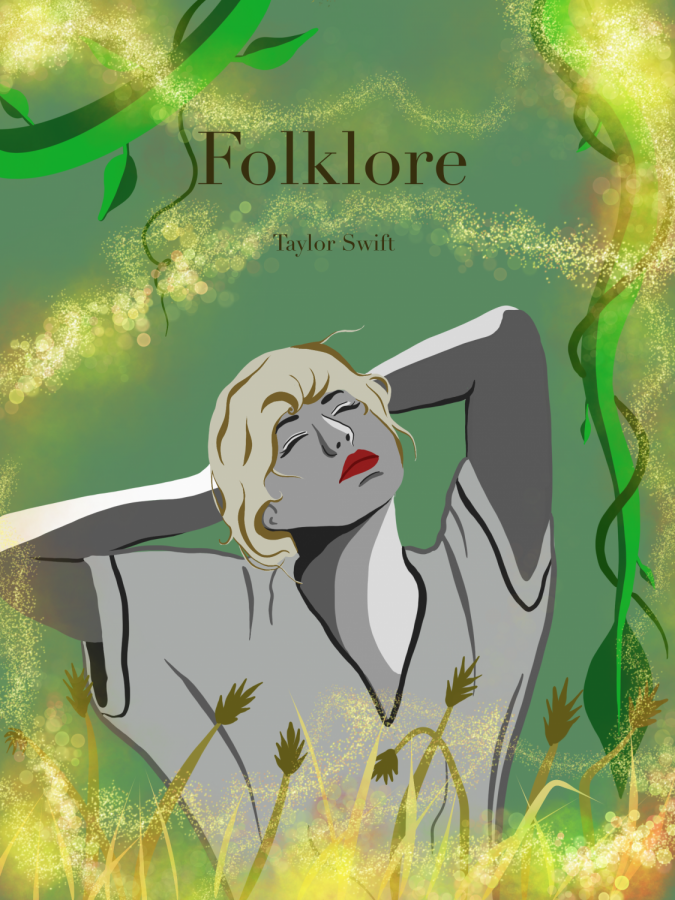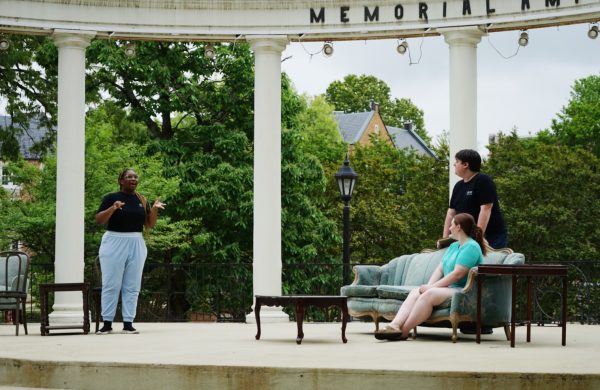Swift’s ‘Folklore’ tells future legends
August 20, 2020
What happens when the artistic mind is isolated and the outside world no longer serves as a muse? Eventually, it will turn to the thoughts that run wild inside it for inspiration. Buried fears and suppressed memories resurface. Visuals form, but their own experience influences the details, like the color of the leaves, rusty doors, broken cobblestones and braided patterns. For Taylor Swift, in the isolation of the Covid-19 pandemic, a number one album was the result.
Swift’s eighth studio album, “folklore,” was announced the day before its surprise release on July 24, 2020. It shocked fans and critics alike, considering it came out less than a year after her 2019 release, “Lover.” Swift has always taken a nearly two year gap in between album releases.
In the letter released with the album she states, “a tale that becomes folklore is one that is passed down and whispered around. Sometimes even sung about. The lines between fantasy and reality blur, and the boundaries between truth and fiction become almost indiscernible. Speculation, over time, becomes fact.” and as a fan, I could not describe the lyrical style of this album any better than this.
The shining star of “folklore” is the fictional love triangle between characters “Betty”, “James” and a third, unnamed girl. This story manifests throughout tracks “cardigan”, “august” and “betty.” It is evident that the three songs are connected, however, much of the album could also feed into this story; “the 1”, “exile”, “this is me trying”, “illicit affairs” and “hoax” all have strong indicators that they connect to the story as well.
Despite fan theories about meanings, the one thing that remains constant throughout “folklore” is that every word spoken is influenced by real feelings and emotions that Swift has felt at some point, even if not in her current state.
Swift opens with “the 1”, a track seeking reassurance in the ideals of an old relationship. She explains how she has been keeping herself busy, but it comes off as distraction seeking. She paints a picture of the “roaring twenties,” stating that if the pennies she tossed in the pool had granted her a wish, the subject of this song would be the one she ended up with. The entire song alludes to the idea that the best outcome for a situation is often times not reality.
The first listen of “cardigan,” the lead single, left listeners who are in tune with Swift’s life with one question: “Did her boyfriend, Joe Alwyn, cheat on her?” Much to fans relief, it is later made clear that this song is from the perspective of the character “Betty,” who receives her own song later in the tracklisting. The intimate details of “cardigan” remind me of Taylor’s stance in her Netflix documentary, “Miss Americana,” which was released earlier this year. The song is haunting and stitched together by the feelings of betrayal and a lack of closure.
Before Swift owned her iconic Rhode Island mansion, it was the home of Standard Oil Heir William “Bill” Harkness and his wife, Rebekah “Betty” Harkness. Track three, “the last great american dynasty” tells the story of Rebekah’s lavish life after Bill’s death. “She had a marvelous time ruining everything,” Swift sings of Harkness, who she then relates to herself. “Holiday house sat quietly on that beach, free of women with madness, their men and bad habits, and then it was bought by me,” she concludes, referring to how she seemingly disrupted the town by buying a house there. It is a romantic history lesson that ties in beautifully to Swift’s life and “folklore” as an album.
Indie legend, Bon Iver, is featured on “exile”, a back and forth exchange between two ex-lovers, one of which is struggling to see the other having moved on into a new relationship. It shows both perspectives of a heartbreak. The lyrics ask compelling, thought provoking questions like “you’re not my homeland anymore, so what am I defending now?”
The struggle with her first label, Big Machine Records, to reclaim the rights to her own masters is one that Swift has faced for years. She now fights passionately for other artists to own their own work. In “my tears ricochet” Swift places her treacherous departure from Big Machine Records as the honoree at a funeral. “If I’m dead to you, why are you at the wake? Cursing my name, wishing I’d stayed” Swift asks, pondering the toxic love the dead and living shared. Chills creep over me every time I hear the bridge: “I can go anywhere I want, anywhere I want, just not home. You can aim for my heart, go for blood, but you would still miss me in your bones.” This sentiment could be applied to any kind of relationship, whether professional, romantic or personal.
The transparent relatability of Swift’s emotions in songs like “my tears ricochet” is addressed on “mirrorball.” Admittedly, this was my least favorite song on the album from the beginning, but I have gained appreciation for it with every listen. In the letter accompanying the album, she admits that this album is full of her secrets and fears, and this song is a reflection of exactly that. I interpret the lyrics to be about Swift’s undeniable ability to sing about the exact issues and scenarios that people are experiencing, but she also questions herself in it, with heart-wrenching lines like, “I’ve never been a natural. All I do is try, try, try.”
In track “seven” Taylor discusses memories of her childhood and talks about her love for a childhood friend. There is a darker side to it as she briefly discusses domestic issues that the friend is having and a desire to help her run away. “And though I can’t recall your face, I still got love for you,” she sings. This sweet, nostalgic tune is a simpler moment
The love triangle returns in full force with “august”, as the other woman in James and Betty’s relationship gets her own voice. This song is a sun-drenched reiteration of memories, embellished by the detailed embodiment of the attachment that forms in a relationship and the accompanying pain and loss of validation when the affair is over. A later track in the album, “illicit affairs” dives deeper into these feelings of worthlessness following the high of a once exciting romantic endeavor. “And thats the thing about illicit affairs and clandestine meetings and stolen stares, they show their truth one single time, but they lie and they lie and they lie a million little times,” as Swift so beautifully puts it.
Perhaps the most eyebrow-raising line on the album comes from “invisible string”, when Swift sings, “Cold was the steel of my axe to grind for the boys who broke my heart; now I send their babies presents.” Many theorize that this is a reference to Swift’s ex Joe Jonas, who recently welcomed a baby with Sophie Turner. Swift and Jonas dated when Swift was 17. Their relationship is the subject of some of Swift’s most vengeful songs from her early albums, in which she expressed disgust with Jonas and Ashley Greene, who played the role of “the other woman” in their love triangle. This story lines up perfectly with many of the themes of “folklore” so far. However, I believe much of the song references how she was always connected to her current partner, Joe Alwyn, as well as the connection she feels to the story of Rebekah Harkness. “A string that pulled me out of all the wrong arms, right into that dive bar…one single thread of gold tied me to you,” she sings. The “dive bar” could be referencing a significant meeting place for her and Alwyn. In her 2017 song, “Delicate,” which has been confirmed to be about Alwyn, she also speaks of the couple going to a dive bar. This song ties all of the elements of “folklore” together to create a lyrical work of poetic art.
“No one likes a mad woman,” Swift sings in the one track on the album that could lyrically fit in the track listing of her album “reputation.” The track “mad woman” could have a number of explanations. It could be inspired by the infamous Kardashian/West feud, be a part of the Rebekah/Betty story, or just an overall account of being betrayed by modern day misogyny. “She should be mad, should be scathing like me, but no one likes a mad woman,” is one of the lines that in my opinion, points to Kardashian, especially when paired with the lyric “I’m taking my time, ‘cause you took everything from me.”
Swift travels back in time in “epiphany” to put herself in the shoes of her grandfather, a military physician during World War II. This slow burning track tragically details haunting war memories that are unspeakable. She takes upon herself the pain that must come from watching people die, making this a beautiful tribute to her grandfather and those that have served.
All of the Easter eggs in “folklore” finally connect when the listener reaches track 14, “betty,” sung from the perspective of James, Betty’s 17 year-old ex boyfriend who cheated on her. He recalls their best memories and ponders how to apologize for his wrongs. This is one of the best songs on the album, and maybe even Swift’s catalogue overall. The themes of innocence and guilt are consuming. It gives interesting perspective as to how the mind works for the opposite sexes at this age. “I’m only 17. I don’t know anything, but I know I miss you,” Swift sings from James’ perspective, while she recalls “I knew everything when I was young,” from Betty’s perspective in “cardigan.” This tale leaves you in suspense and in awe of Swift’s storytelling ability. Another perspective of the same incident is given on “this is me trying.”
The one song on “folklore” that I believe to be completely about Joe Alwyn is “peace.” In another expression of her fears, Swift professes her love for Alwyn while asking the painful question, “would it be enough if I could never give you peace?” She fears that with her status that she can never have a life with him where he is kept completely out of the public eye. This track is full of beautiful analogies for these feelings, such as “there’s robbers to the east, clowns to the west. I’d give you my sunshine, give you my best, but the rain is always gonna come if you’re standing with me.” The question is left unanswered at the end of the song, leaving the listener in the same state of uncertainty that she is in.
The conclusion of the album, “hoax,” is an outro from what I perceive to be Betty’s perspective, however, it could have ties to the theme of owning her work that is visited in “my tears ricochet.” The concept of referring to her work as her love throughout the album is one that intrigues me. But as she stated with the album’s release, these songs are now up to the listener’s interpretations, and those interpretations will be the stories that get passed down.
Overall, “folklore” is some of Swift’s best work. Its soft, simplistic vocals and stripped instrumentation serve as a welcomed break from her glossy pop anthems. Taylor Swift proves time and time again that she is one of the best creatives of our generation.













